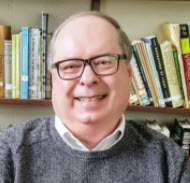 In January I began teaching another course on the people called Quakers. I teach this class, with some variation, at least twice a year. It is a class designed to help those who are in the process of discerning whether or not to become members of Cincinnati Friends Meeting, as well as those who would like a refresher course of the history of their faith community. It is always a joy for me to interact with persons who are new to discovering who the Quakers are historically, but also what we are about in the present. I am especially grateful to Sabrina Darnowsky, who teaches the section on the history of Cincinnati Friends Meeting, a history that is detailed in her wonderful book Friends Past and Present: The Bicentennial History of Cincinnati Friends Meeting (1815-2015).
In January I began teaching another course on the people called Quakers. I teach this class, with some variation, at least twice a year. It is a class designed to help those who are in the process of discerning whether or not to become members of Cincinnati Friends Meeting, as well as those who would like a refresher course of the history of their faith community. It is always a joy for me to interact with persons who are new to discovering who the Quakers are historically, but also what we are about in the present. I am especially grateful to Sabrina Darnowsky, who teaches the section on the history of Cincinnati Friends Meeting, a history that is detailed in her wonderful book Friends Past and Present: The Bicentennial History of Cincinnati Friends Meeting (1815-2015).
At some point in my teaching of this class I will state, "I stand in awe of the rich Quaker heritage that I have inherited." This is not an overstatement. My family can trace its Quaker roots to the mid-seventeenth century when George Fox, the founder of Quakerism, began his ministry in northern England—a part of the world that I will have the privilege of visiting again in April. The Newby name is found in several accounts of early Friends' work. One of my relatives paid a particularly high price for her faith. In his book The Beginnings of Quakerism, Vol. 1, William Braithwaite shares the story of Margaret Newby, a distant cousin of mine, who dared to share her Quaker faith in public in 1655, thirty-four years before the Act of Toleration of 1689. Braithwaite explains:
The place had already earned the name of ‘the persecuting town of Evesham’ when in the middle of a cold November two women Friends in Westmoreland, Margaret Newby and Elizabeth Cowart, came to it. After a large meeting, they went to visit prisoners. The townspeople were excited against the Quakers, and when one of the women, Margaret Newby, began to address them she was arrested and put in the stocks.
Margaret Newby was left in the stocks and the cold damp weather for seventeen hours. As a result of this exposure, she later died. Her life and her witness were a source of enduring hope and strength for many others.
Another one of my relatives is mentioned in the famous Journal of John Woolman. Samuel Newby, my sixth great-grandfather, was traveling with John Woolman in North Carolina. Woolman writes:
When I was at Newbegun Creek a Friend was there who labored for his living, having no slaves, and who had been a minister many years. He came to me the next day, and as we rode together, he signified that he wanted to talk with me concerning a difficulty he had been under, which he related nearly as follows: That as monies had of late years been raised by a tax to carry on wars, he had a scruple in his mind in regard to paying it, and chose rather to suffer distraint of his goods, but as he was the only person who refused it in those parts, and knew not that anyone else was in the like circumstances, he signified that it had been a heavy trial to him, especially as some of his brethren had been uneasy with his conduct in that case. He added that from a sympathy he felt with me yesterday in meeting, he found freedom thus to open the matter in way of querying concerning Friends in our parts. I told him the state of Friends amongst us as well as I was able, and also that I had for some time been under the like scruple. I believe him to be one who was concerned to walk uprightly before the Lord, and esteemed it my duty to preserve this note concerning him, Samuel Newby.
I am grateful for the people called Quakers, a beloved tradition that provided Margaret and Samuel the faithful impetus to become the examples of loving ministry that they shared with others. And I am grateful for Cincinnati Friends Meeting for continuing this important tradition of faithful impetus in the twenty-first century, as we seek to work for peace and justice in a world of war and chaos. May we continue to follow the vision of William Penn when he said, "Let us see what love can do."
